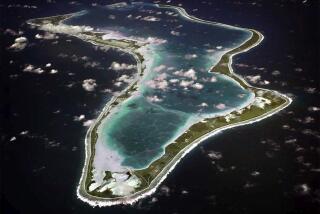Britain, Argentina OK Steps to Normalize Ties : 7 Years After War, Both Sides Agree to Set Aside Touchy Issue of Sovereignty Over the Falklands
- Share via
BUENOS AIRES — Seven years after their brief but bloody war over the Falkland Islands, Argentina and Britain took the first steps Friday toward resuming normal diplomatic and commercial ties.
After two days of talks, British and Argentine officials agreed to set aside for now the issue of sovereignty over the tiny group of islands in the South Atlantic, which both nations claim.
A joint statement issued in Buenos Aires, London and New York said that the two sides will meet in Madrid on Oct. 17-18 to discuss a broad array of bilateral issues, including reopening air and sea links and resuming sports and cultural contacts.
The statement also disclosed that several changes will take effect immediately, such as removing the current limit of four diplomats from each country in the other’s capital.
Policy Victory for Menem
The resumption of negotiations with Britain, once a key economic partner for Argentina, was a major foreign policy initiative of the six-week-old Peronist government of President Carlos Saul Menem. It also underscored the importance to Argentina of making friends abroad as it confronts the nation’s worst economic crisis on record and seeks fresh investment and capital.
The 10-week war of 1982 over the Falklands, called the Malvinas by Argentina, left 255 British and about 750 Argentine troops dead and ruptured traditionally strong links. The military regime that launched the war to reclaim the islands was humiliated when British forces recaptured the archipelago. Eighteen months later, the regime handed power over to elected civilian President Raul Alfonsin.
Alfonsin sought to open talks with Britain but insisted on including on the agenda the issue of sovereignty over the islands, something Prime Minister Margaret Thatcher refused to discuss. The only previous attempt to open a dialogue ended in deadlock in 1984.
Did Argentina Gain?
Legislator Federico Storani, an Alfonsin confidant, complained that Argentina had gotten nothing from Britain in return for agreeing, for now, not to discuss sovereignty. But Menem’s foreign minister, Domingo Cavallo, said that Argentina achieved precisely what had been sought unsuccessfully since the war.
Menem repeatedly vowed during his campaign that he would seek negotiations to end what Argentines view as Britain’s 156-year illegal occupation of the islands.
In early August, Menem lifted Argentina’s ban on British imports as a good-faith gesture, matching a British measure in 1985. That helped set the stage for the New York talks between Argentine government representative Lucio Garcia del Solar and Britain’s ambassador to the United Nations, Crispin Tickell.
To Ease Restrictions
The immediate measures focus on deepening communication by easing restrictions on the number and activities of diplomats. The four accredited British diplomats now in Buenos Aires technically form the British interests section of the Swiss Embassy, while the Argentines in London make up an interests section in the Brazilian Embassy. Before the war, each nation had about 20 diplomats in the other nation’s capital.
The two interests sections will be allowed to resume direct, secure communications with their home governments, instead of communicating through the host embassies. The diplomats can also have direct contacts with their respective foreign ministries rather than have to go through the Swiss and Brazilian embassies.
For Argentina, the prospect of reopening ties with Britain means not only a chance to boost trade with that country, but also to improve relations with Britain’s allies in the European Community. British sales to Argentina last year totaled 13 million pounds ($20.8 million), while Argentina sold about 60 million pounds’ worth of goods to Britain, less than half the average total just before the war.
Exclusive Fishing Zone
Argentina also hopes for an end to Britain’s 150-mile exclusive fishing zone around the islands, located about 300 miles east of the southern tip of Argentina. The exclusion zone, imposed in 1986, has meant an economic boom for the nearly 2,000 islanders, who earned a profit of nearly 10 million pounds in 1988 from fishing licenses for foreign fleets.
Foreign Minister Cavallo, an economist by training who emphasizes Argentina’s need to improve ties with developed countries, called the first phase of negotiations “very promising.”
He told reporters that Britain had in effect recognized that sovereignty is disputed by agreeing formally to put the issue “under an umbrella,” in Menem’s words, while moving forward on other issues. He said he was pleased that the agenda was not limited to a few points, but embraced nearly every aspect of the two nations’ mutual interests.
“We have achieved this because abroad there is acceptance that democracy has been consolidated in our country and that the (elected) political authority has the necessary control to carry out these negotiations,” Cavallo said.
More to Read
Sign up for Essential California
The most important California stories and recommendations in your inbox every morning.
You may occasionally receive promotional content from the Los Angeles Times.













